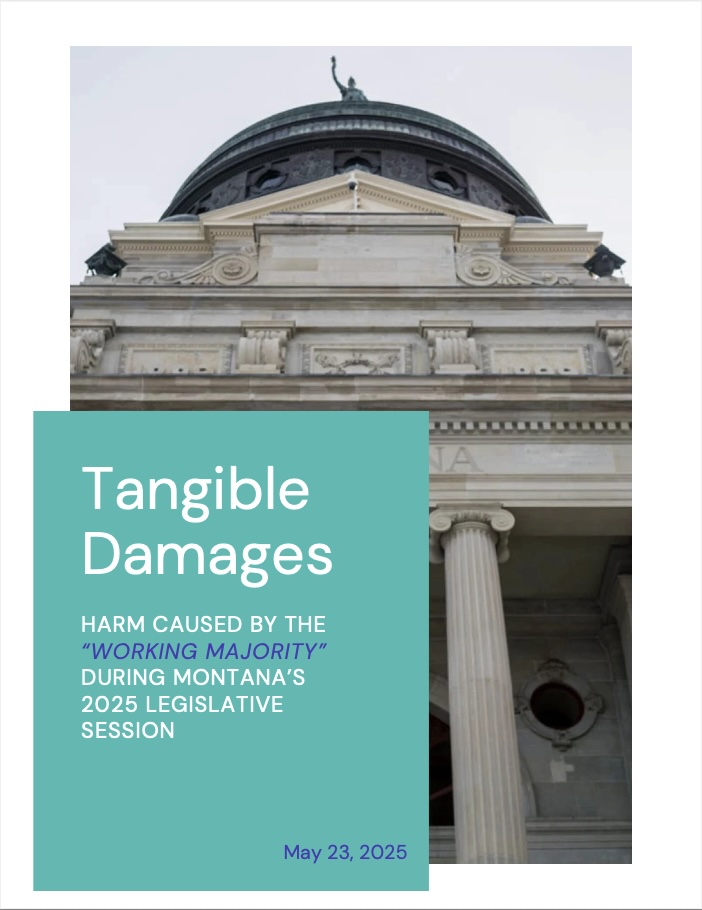HELENA, MT — A 23-page internal Montana Democratic Party report obtained by Western Montana News reveals strategic disarray and ideological entrenchment within the party following the 2025 legislative session. Titled Tangible Damages: Harm Caused by the ‘Working Majority’ During Montana’s 2025 Legislative Session and dated May 23, 2025, the document was publicly released by Montana attorney Matthew Monforton via social media. Monforton declined to identify his source for the full report.

The report criticizes Democratic legislators who aligned with Republican Gov. Greg Gianforte and his legislative allies, warning that the party now faces an “existential threat” without an aggressive judicial strategy, out-of-state funding, and control of the redistricting process. The memo outlines how Democrats, having failed to secure broad voter support, have shifted their political survival strategy toward leveraging Montana’s courts and ballot initiative system.
Courts as the Last Bastion
The most revealing passages center on the party’s dependence on Montana’s judicial system. One section bluntly states: “A citizens’ initiative to enshrine the nonpartisanship of judicial races in the state Constitution must pass on the next ballot (2026), or Democrats and the left will face an existential threat.”
This admission amounts to a strategic confession. Democrats understand that their electoral path is narrowing amid cultural backlash. Montana’s courts—not the electorate—have become the firewall for policies the party cannot pass through legislation.
The report concedes that this strategy could backfire: “Every time a court rules against these extreme bills, it fuels Montana Republicans’ zealous attacks on the courts, bolstering their claims of judicial politicization.” Yet Democrats double down, asserting that independent judges “uphold Constitutional rights… and ensure the continued nonpartisanship of Montana’s congressional and legislative redistricting process.”
In other words, Democrats see control of the courts as the key to securing not just policy victories—but district lines themselves.
Redistricting by Lawsuit
The memo further underscores how Democrats broke the GOP supermajority in 2024—not by winning new voters, but by securing court approval for favorable redistricting maps. The strategy concentrated on pulling rural communities surrounding college towns like Missoula and Bozeman into urban-centric districts—maneuvers that critics have called gerrymandering-by-judiciary.
The party frames this as a safeguard of fairness. But the report itself suggests that Democrats recognize the maps would not have survived public scrutiny alone. As the memo warns, without a 2026 constitutional amendment to protect so-called “nonpartisan” judicial elections, “House Democrats could easily go from holding 42 seats… to holding a maximum of 28 seats.”
Admission: Outside Money Is Essential
Among the most revealing admissions in Tangible Damages is the party’s reliance on out-of-state financing to win ballot initiatives. The report highlights legislation like HB 818, introduced by Rep. Braxton Mitchell and signed into law in May 2025, which prohibits contributions or expenditures by foreign nationals—defined broadly to include non-citizen individuals, foreign governments, or majority-foreign-owned entities—for statewide ballot initiative campaigns.
The legislation specifically targets groups like the Sixteen Thirty Fund, which funded Montana’s 2024 abortion initiative campaign and draws financial backing from international donors such as Swiss billionaire Hansjörg Wyss. As Western Montana News previously reported, even HB 818 wouldn’t have stopped $3 million in foreign-connected funding that flowed to the Democrat’s abortion amendment campaign.
Democrats acknowledge they struggle to raise sufficient grassroots money from within Montana. The report characterizes the law as making it “more difficult for Democrats to gain the financial backing necessary to run a successful initiative campaign.” That single line confirms what Republicans have long alleged: without national (or international) donor networks, the Montana Democratic Party can’t fund its own agenda.
Trans Legislation as a Political Wedge
Nowhere is the Montana Democratic Party’s disconnect from the electorate more glaring than in its obsession with being so-called “allies” with “LGBTQ” individuals and defending transgender procedures for minors—the latter being an issue that repulses most Montanans and is rapidly collapsing under public scrutiny.
The Tangible Damages report devotes multiple pages to what it describes as an “onslaught” of anti-trans legislation, including bills regulating bathroom access, sports participation, and restrictions on so-called “gender-transition” procedures for children. Yet even as the state’s last facility halted such procedures entirely—as Western Montana News recently reported—the Democrats double down.
Rather than confronting why gender ideology has become a political liability—even among moderates—the party portrays itself as a victim of a culture war. It laments that court rulings against these bills “fuel Republicans’ zealous attacks on the courts,” as if the courts should be insulated from criticism when used as a partisan tool.
The political calculus is now backfiring. The party’s extreme position—defending medical interventions on minors as a civil right—has made it increasingly out of touch, not just with conservatives, but with independents and disaffected liberals. Clinging to this cause may win praise from activists and donors, but it continues to alienate the voters they need most.
Education Funding’s Inverted Pyramid
The report expresses frustration with the STARS Act (HB 252), a Republican-backed education funding bill focused on raising starting teacher pay. Democrats argue the policy does too little for “mid-career or senior teachers or administrators,” revealing the party’s continued focus on entrenched personnel systems and top-heavy education bureaucracy.
But this criticism misses the forest for the trees. The bill’s emphasis on entry-level wages targets one of the state’s most pressing challenges: Montana has long ranked near the bottom nationally in starting teacher salaries, making it difficult for rural and high-need districts to attract new educators.
The memo admits that Democratic attempts to inject additional funding into broader school formulas—attempts that might have propped up administrative budgets—were blocked by Rep. Llew Jones and the Republican majority. But what the report frames as legislative sabotage was likely seen by voters as fiscal responsibility. Montana taxpayers rejected school levies across the state in 2024, citing waste and a lack of measurable results. Public trust in education spending is in freefall—and the Democratic platform appears indifferent to that crisis.
Perhaps most telling is what the report doesn’t say. There is no mention of performance accountability, student outcomes, parental involvement, or learning loss. The party’s focus remains inward—on keeping dollars flowing into a system voters increasingly see as broken. If education remains a defining issue in 2026, Democrats may find their priorities are not just unpopular but politically indefensible.
A “Working Majority” or a Trojan Horse?
One glaring omission in the Democrats’ Tangible Damages report is the mirror image of their complaint: if Democrats feel betrayed by a Republican-Democrat “working majority,” grassroots conservatives feel even more betrayed by the Republicans who made that coalition possible.
According to Montana attorney Matthew Monforton and other longtime GOP grassroots activists, the true story of the 2025 session isn’t Democratic failure—it’s Republican capitulation. The group of lawmakers Democrats call “The Nine” are, in conservative circles, known as enablers of the Gianforte-Jones coalition: a centrist governing bloc that they call “The Nasty Nine” that has consistently traded away platform principles for power-sharing and pork-barrel payouts.
Monforton compares the moment to the Cold War’s Venona Papers, calling the leaked memo a rare glimpse into how Republican leadership—namely Gov. Gianforte and Rep. Llew Jones—cut deals with Democrats to preserve left-wing control of Montana’s judiciary. The price? Killing meaningful judicial reform, keeping property taxes high, and protecting a bloated bureaucracy while allowing conservative bills on school choice, abortion, religious freedom, and the trans agenda to die on the vine.
Democrats complain that this “working majority” failed to deliver progressive outcomes. But for conservatives, it didn’t just fail—it sabotaged. The 2025 legislative session, in this view, wasn’t a political compromise. It was a betrayal.
This framing has serious implications as Montana approaches the 2026 cycle. If both parties’ bases believe their priorities were sold out by the same bloc of insiders, then the next battle may not be between red and blue—but between entrenched dealmakers and a growing rebellion in both parties.
The sentiment extends beyond grassroots activists. Former Republican representative and GOP Executive Board member Brad Tschida responded to Monforton’s Facebook post, describing the report as revealing Democratic “complicity in passing Llew’s agenda.” Tschida characterized Gianforte as “simply along for the ride, since he appears to work for, and not with Llew,” adding that “Jones is a skilled deal maker, but he deceives people into thinking he works for citizens, when he actually serves his own interests and those of his cronies.”
The Elephant in the Room: Tone-Deaf Policy
Nowhere in the 23-page document do Democrats grapple with their broader problem: the Montana electorate is rejecting their cultural values. Not because voters are brainwashed, but because Democrats are out of step on the big 80/20 issues—child gender transition, biological males in women’s sports, illegal immigration, and the steady erosion of public education standards.
Montana Democrats are not victims of redistricting or rogue Republicans. They are victims of their own ideological rigidity and refusal to read the room. Until they confront that reality, no amount of judicial maneuvering or out-of-state money will reverse their decline.
Strategic Document or Emotional Vent?
In the end, the Tangible Damages report reads less like a postmortem and more like a chessboard strategy. Its anger may be genuine, but its purpose is clear: rally support for judicial initiatives, defend redistricting outcomes, and secure outside money before the 2026 election cycle begins in earnest. Oh, and double down on the culture war.
The Independent Record in Helena initially reported on the memo’s existence but focused on internal party criticism over airing dirty laundry rather than examining the document’s contents. The publication never released the full memo to the public, steering coverage away from the strategic admissions within and presenting the public with kayfabe. But the real story isn’t the sniping. It’s the Montana Democratic Party’s blueprint for political survival that explicitly rejects democratic accountability—a party that no longer wins through persuasion, but through procedure.
What’s most striking about this 23-page document is what it doesn’t contain: genuine self-reflection. There is no acknowledgment that Democratic priorities might be unpopular with actual Montana voters. No recognition that their obsession with transgender ideology, their dependence on foreign funding, or their embrace of judicial activism might be driving away the working-class voters they claim to represent.
Instead, the report presents a party that cannot fail—only a party that has been failed. Failed by turncoat Republicans. Failed by an insufficiently progressive judiciary. Failed by campaign finance laws that limit access to international donors. The common thread is clear: when Montana Democrats lose, it’s never because they’re wrong—it’s because the system is rigged against them.
This victim mentality reveals a party that has fundamentally abandoned persuasion in favor of procedural manipulation. Rather than asking why their message isn’t resonating with Montana families, they’re strategizing how to circumvent those families entirely through court orders and out-of-state money.
